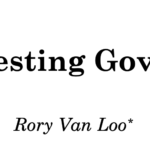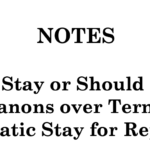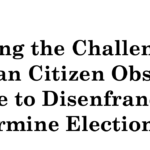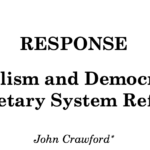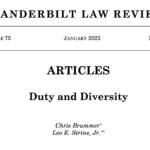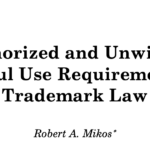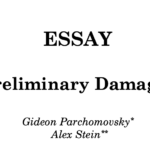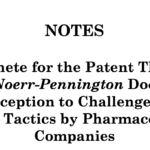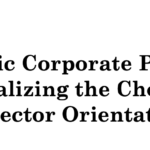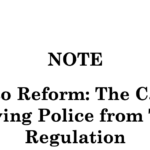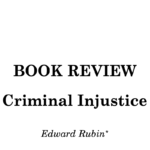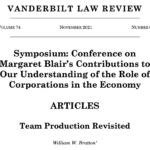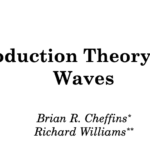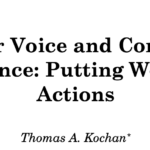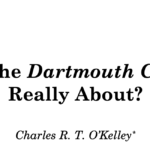Volumes Category
Stress Testing Governance
Mar. 22, 2022—Rory Van Loo | 75 Vand. L. Rev. 553 (2022) | In their efforts to guard against the world’s greatest threats, administrative agencies and businesses have in recent years increasingly used stress tests. Stress tests simulate doomsday scenarios to ensure that the organization is prepared to respond. For example, agencies role-played a deadly pandemic spreading from...
Should It Stay or Should It Go: The Clash of Canons over Termination of the Automatic Stay for Repeat Filers
Mar. 22, 2022—John H. Gibbons | 75 Vand. L. Rev. 615 (2022) | One of the most important debtor protections provided by bankruptcy law is the automatic stay, which stops creditors from pursuing collection actions against the debtor. Over time, however, debtors began to abuse the stay by repeatedly filing for bankruptcy each time a creditor tried to...
Challenging the Challengers: How Partisan Citizen Observers Contribute to Disenfranchisement and Undermine Election Integrity
Mar. 22, 2022—Kate Uyeda | 75 Vand. L. Rev. 657 (2022) | Almost every state allows political parties to sponsor and train private citizens to serve as election observers and sometimes even to challenge the eligibility of other private citizens to vote. These partisan citizen observers, referred to in this Note as “PCOs,” have far too often perpetuated...
Radicalism and Democracy in Monetary System Reform
Feb. 1, 2022—John Crawford | 75 Vand. L. Rev. En Banc 55 (2022) | The People’s Ledger is meant to offer “a blueprint for reform that would radically democratize access to money and control over financial flows in the nation’s economy.” Admitting that radical reform of the current system demands consideration, and that democratizing money is desirable,...
Duty and Diversity
Jan. 24, 2022—Chris Brummer & Leo E. Strine, Jr. | 75 Vand. L. Rev. 1 (2022) | In the wake of the brutal deaths of George Floyd and Breonna Taylor, lawmakers and corporate boards from Wall Street to the West Coast have introduced a slew of reforms aimed at increasing Diversity, Equity, and Inclusion (“DEI”) in corporations. Yet...
Local Power
Jan. 24, 2022—Alexandra B. Klass & Rebecca Wilton | 75 Vand. L. Rev. 93 (2022) | This Article is about “local power.” We use that term in two distinct but complementary ways. First, local power describes the authority of local governments to enact regulatory policies in the interests of their citizens. Second, local power describes the authority of...
Unauthorized and Unwise
Jan. 24, 2022—Robert A. Mikos | 75 Vand. L. Rev. 161 (2022) | For decades, the United States Patent and Trademark Office (“PTO”) has required trademark owners to comply with sundry nontrademark laws governing the sale of their trademarked goods and services. Pursuant to this “lawful use requirement,” the Agency has refused or even cancelled registration of thousands...
Preliminary Damages
Jan. 24, 2022—Gideon Parchomovsky & Alex Stein | 75 Vand. L. Rev. 239 (2022) | Historically, the law helped impecunious plaintiffs overcome their inherent disadvantage in civil litigation. Unfortunately, this is no longer the case: modern law has largely abandoned the mission of assisting the least well-off. In this Essay, we propose a new remedy that can dramatically...
A Machete for the Patent Thicket
Jan. 24, 2022—Lisa Orucevic | 75 Vand. L. Rev. 277 (2022) | Outrageous drug prices have dominated news coverage of the American healthcare system for years. Yet despite widespread condemnation of skyrocketing drug prices, nothing seems to change. Pharmaceutical companies can raise drug prices with impunity because they hold patents on their drugs, which give them monopolies. These...
Dynamic Corporate Purpose
Jan. 24, 2022—Fields Pierce | 75 Vand. L. Rev. 325 (2022) | The debate over corporate purpose has turned into a “gordian knot” where parties with entrenched beliefs about what the corporation should or should not be within society refuse to waver. There are inherent flaws with the governance models proposed by academics, politicians, and practitioners alike, so...
Road to Reform: The Case for Removing Police from Traffic Regulation
Jan. 11, 2022—Aaron Megar | 75 Vand. L. Rev. En Banc 13 (2022) | This Note advocates for the removal of police from traffic-law enforcement and the creation of unarmed Civilian Traffic Forces (“CTF”) at the municipal and state levels. Since the Supreme Court’s decision in Whren, there has been a significant amount of legal scholarship criticizing...
Criminal Injustice
Jan. 11, 2022—Edward Rubin | 75 Vand. L. Rev. En Banc 1 (2022) | Reviewed: JED S. RAKOFF, WHY THE INNOCENT PLEAD GUILTY AND THE GUILTY GO FREE: AND OTHER PARADOXES OF OUR BROKEN LEGAL SYSTEM, Farrar, Strauss & Giroux 2021. Pp. 208. $27.00 Hardcover. As its title suggests, Why the Innocent Plead Guilty and the Guilty...
Team Production Revisited
Nov. 24, 2021—William W. Bratton | 74 Vand. L. Rev. 1539 (2021) | This Article reconsiders Margaret Blair and Lynn Stout’s team production model of corporate law, offering a favorable evaluation. The model explains both the legal corporate entity and corporate governance institutions in microeconomic terms as the means to the end of encouraging investment, situating corporations within...
Team Production Theory Across the Waves
Nov. 24, 2021—Brian R. Cheffins & Richard Williams | 74 Vand. L. Rev. 1583 (2021) | Team production theory, which Margaret Blair developed in tandem with Lynn Stout, has had a major impact on corporate law scholarship. The team production model, however, has been applied sparingly outside the United States. This article, part of a symposium honoring Margaret...
Worker Voice and Corporate Governance: Putting Words into Actions
Nov. 24, 2021—Thomas A. Kochan | 74 Vand. L. Rev. 1625 (2021) | The encouraging news is that in 2019 the Business Roundtable recanted on its 1997 statement. Its members recognized that prioritizing shareholder value had gone too far; now they again endorsed the principle that a corporation should be held responsible for addressing the interests of not...
What Was the Dartmouth College Case Really About?
Nov. 24, 2021—Charles R. T. O’Kelley | 74 Vand. L. Rev. 1645 (2021) | In 1769, King George III issued a Royal Charter incorporating twelve persons as The Trustees of Dartmouth College with the right of self-perpetuation. The charter also identified one of the trustees, Eleazar Wheelock, as the founder and initial president of the corporation, with the right...
